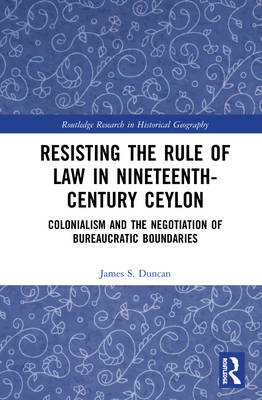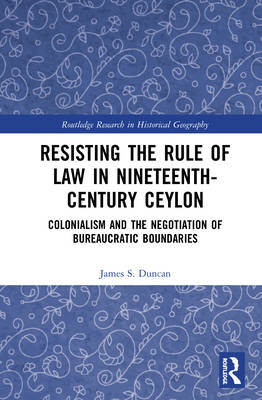
- Retrait gratuit dans votre magasin Club
- 7.000.000 titres dans notre catalogue
- Payer en toute sécurité
- Toujours un magasin près de chez vous
- Retrait gratuit dans votre magasin Club
- 7.000.000 titres dans notre catalogue
- Payer en toute sécurité
- Toujours un magasin près de chez vous
Resisting the Rule of Law in Nineteenth-Century Ceylon
Colonialism and the Negotiation of Bureaucratic Boundaries
James S DuncanDescription
This book offers in-depth insights on the struggles implementing the rule of law in nineteenth century Ceylon, introduced into the colonies by the British as their "greatest gift." The book argues that resistance can be understood as a form of negotiation to lessen oppressive colonial conditions, and that the cumulative impact caused continual adjustments to the criminal justice system, weighing it down and distorting it.
The tactical use of rule of law is explored within the three bureaucracies: the police, the courts and the prisons. Policing was often "governed at a distance" due to fiscal constraints and economic priorities and the enforcement of law was often delegated to underpaid Ceylonese. Spaces of resistance opened up as Ceylon was largely left to manage its own affairs. Villagers, minor officials, as well as senior British government officials, alternately used or subverted the rule of law to achieve their own goals. In the courts, the imported system lacked political legitimacy and consequently the Ceylonese undermined it by embracing it with false cases and information, in the interests of achieving justice as they saw it. In the prisons, administrators developed numerous biopolitical techniques and medical experiments in order to punish prisoners' bodies to their absolute lawful limit. This limit was one which prison officials, prisoners, and doctors negotiated continuously over the decades.
The book argues that the struggles around rule of law can best be understood not in terms of a dualism of bureaucrats versus the public, but rather as a set of shifting alliances across permeable bureaucratic boundaries. It offers innovative perspectives, comparing the Ceylonese experiences to those of Britain and India, and where appropriate to other European colonies. This book will appeal to those interested in law, history, postcolonial studies, cultural studies, cultural and political geography.
Spécifications
Parties prenantes
- Auteur(s) :
- Editeur:
Contenu
- Nombre de pages :
- 264
- Langue:
- Anglais
- Collection :
Caractéristiques
- EAN:
- 9780367515515
- Date de parution :
- 06-07-20
- Format:
- Livre relié
- Format numérique:
- Genaaid
- Dimensions :
- 156 mm x 234 mm
- Poids :
- 566 g







